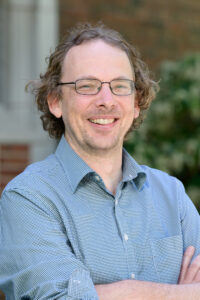Trinity College Professor to Lead National Center for the Defense of Academic Freedom
Throughout the past century, the American Association of University Professors (AAUP) has met success in its stated mission to advance academic freedom and shared governance. But the threats have vastly changed since its founding in 1915.
In recognition of today’s higher education landscape that includes government intervention, celebrity extremists, personal attacks on social media, and foreign interference, the organization recently launched a new center and appointed as its director Isaac Kamola, associate professor of political science at Trinity College.

When the AAUP came into existence in the early part of the 20th century, the challenges faced by faculty based on scholarship or views—McCarthyism, creationism—looked much different.
“Today the AAUP faces its greatest challenge ever,” said the center announcement. “The growing prevalence of academic gag orders, online harassment of faculty members, and legislative and donor intervention into the university constitutes an attack on higher education that extends beyond individual faculty members.”
As director of the new center Kamola’s focus on cultivating research and raising visibility for research about current threats and responses, is an extension of academic work he has been doing over the past several years.
In 2021, his book Free Speech and Koch Money: Manufacturing a Campus Culture War looked at a pattern of high-profile “free speech” incidents that had rocked U.S. college campuses.
Right-wing speakers faced considerable protest, with many being disinvited from speaking. The incidents were widely circulated as examples of the academy’s intolerance towards conservative views. But the response was not the spontaneous outrage of the liberal colleges, noted Kamola, who posited that a darker element was manufacturing the crisis, funded by political operatives, and designed to achieve specific political outcomes.
Raising visibility for the money that funds such initiatives is critical in raising awareness, said Kamola.
The AAUP announcement noted, “We need to abandon the ‘campus free speech’ narrative and instead follow the money if we ever want to root out this dangerous network from our universities.”
AAUP is positioned to undertake two specific projects to support the defense of higher education from politicized intervention: the creation of an intellectual space tasked with developing a detailed understanding of the landscape of current attacks, and the ability to bring together academics and media professional to raise awareness among the public.
The Center on the Defense of Academic Freedom will be comprised of about 15 fellows who will meet at least monthly throughout the course of a two-year term. An additional five shorter-term experts will be brought on as consultants on specific issues. In addition, the center is considering the inclusion of a journalist or journalism professor who could help the working group fellows write for, and place, pieces in the media.
In addition to the dialogue among the fellows, the center will host public events and talks to expand the audience. Outcomes are expected to include white papers and strategy documents.
Currently, academic freedom is primarily protected through the inclusion of policies in faculty handbooks and collective bargaining agreements at individual institutions, said the AAUP. The working group will examine different approaches to protecting academic freedom given the current threats.
“If the institutions within which we work are to survive as anything more than limited training facilities for most of their students and privileged centers of intellectual growth for the 1 percent, we must recalibrate our operations,” the AAUP noted.
